The War on Terror Is a War on Minnesota's Peaceful, Entrepreneurial Somali Immigrants
The Somali community in Minnesota has become a microcosm for the national debate over immigration, refugee resettlement, and national security.
When Abdirahman Kahin landed in the United States in 1997, he only knew a handful of people. He pooled his money with a few other Somali refugees who landed the same day in Atlanta. They rented a van, pointed the steering wheel north and headed for Minnesota, a strange land nothing like their former home.
Twenty years after fleeing war and famine in Somalia, Kahin is peacefully feeding hundreds of Minnesotans every day. He's the owner of The Afro Deli, a successful restaurant that he opened in 2010 after more than a decade of working low-paying jobs. He serves Somali food, but made "Minnesota spicy" as a concession to the stereotypically Nordic tastes of many Midwesterners. The restaurant, Kahin says, is a bridge between cultures.
But his big smiles and delicious food belie the difficulties that Kahin and others like him have faced in coming to America and building a life here. He has a classic immigrant success story, one that has been replicated for centuries as waves of foreigners seek a better life. But he worries that America is now making it harder than ever for others to follow in his footsteps.
Somali refugees like Kahin have faced many of the same difficulties as other immigrant groups coming to America. They've had to learn a new language, find work, and build new social connections. They've faced racism and intolerance from those who came here before them. They've been on the outside of the political order, living in a democracy without having a voice in it.
Over time, like Kahin, they have moved closer to the inside. The first Somali-American state legislator was elected in Minnesota last year. But even as these immigrants settle in, the community finds itself facing a new set of challenges.
Minnesota's Somali communities have become domestic fronts in the war on terror. Federal law enforcement agencies have singled out Somali Muslims in the Twin Cities for a special surveillance program intended to curb terrorism since 2011. But there is little evidence that this program has been successful.
President Donald Trump, meanwhile, has instructed the federal government to step up the scrutiny of immigrants and refugees from a number of Muslim-majority countries. The Trump administration's so-called "travel ban" has gone through various iterations since January, but every version has included Somalia on the list of places from which visitors will be uniformly labeled as threats. The administration has also taken steps to reduce the number of refugees allowed into America. Only 45,000 will be accepted next year, down from the previous floor of 67,000 set by President Ronald Reagan in 1986.
Against this national political backdrop, the Somali community in Minnesota has become a microcosm for the national debate over immigration, refugee resettlement, and national security. Under President Trump, the war on terror and the fight over immigration have become the same thing.
"The goal is to build neighborhoods from within."
Bounded by a pair of interstates and tucked into a curve of the Mississippi River on the east side of Minneapolis, the Cedar-Riverside neighborhood has long been a landing point for foreigners. The area was first settled in the 1890s by Germans and Swedes who came looking for work in the city's legendary flour mills. Vietnamese and South Asian immigrants reshaped the community during the 1970s, when the Riverside Plaza, a set of brutalist concrete apartment buildings that serve as a centerpiece for the neighborhood, was built.
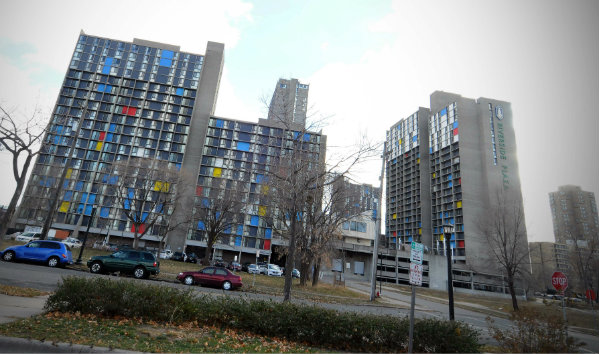
In 1993, the United States began accepting refugees from Somalia after that country's government collapsed amid a regional civil war and famine. Many of the displaced resettled in Minneapolis. With a small community established there, others followed. Today, the Twin Cities are home to the largest Somali diaspora anywhere in the world outside of Africa.
Thousands more refugees have followed a similar path in the 20 years since. In 2015, the most recent year for which complete data is available, over 8,800 Somali refugees were resettled in the United States, with more taking up residence in Minnesota than anywhere else. Overall, more than 30,000 Somalis live in the state, according to U.S. Census data. The majority are in Minneapolis, but sizable communities have also been established in places like St. Cloud and Mankato.
Kahin arrived in Cedar-Riverside in 1997 after making the cross-country drive from Atlanta. He was just 20 years old. After struggling to find work, he landed a job with a video production company and eventually ran his own video business, filming weddings and other events. He also took classes at St. Thomas University's business school in downtown Minneapolis, and eventually earned his MBA.
Eventually, he entered the restaurant industry. His first venture was a failure, but The Afro Deli found success when he opened it in 2010 on the main drag of the Cedar-Riverside neighborhood, an area peppered with small, dimly lit bars, coffee shops, and independent theaters—a consequence of the neighborhood's relatively affordable rents and close proximity to the University of Minnesota—along with halal groceries and other Somali-owned service sector businesses.
Just last year, Kahin closed that location and re-opened The Afro Deli on the opposite side of the University of Minnesota campus, along the bustling Washington Avenue corridor. His new place—with menus displayed on shiny HD television screens, an exposed kitchen, and neon booths bathed in natural light from floor-to-ceiling front windows—looks like any other upscale fast food eatery. It fits right in between a Bruegger's Bagels and a generic college town pizzeria.
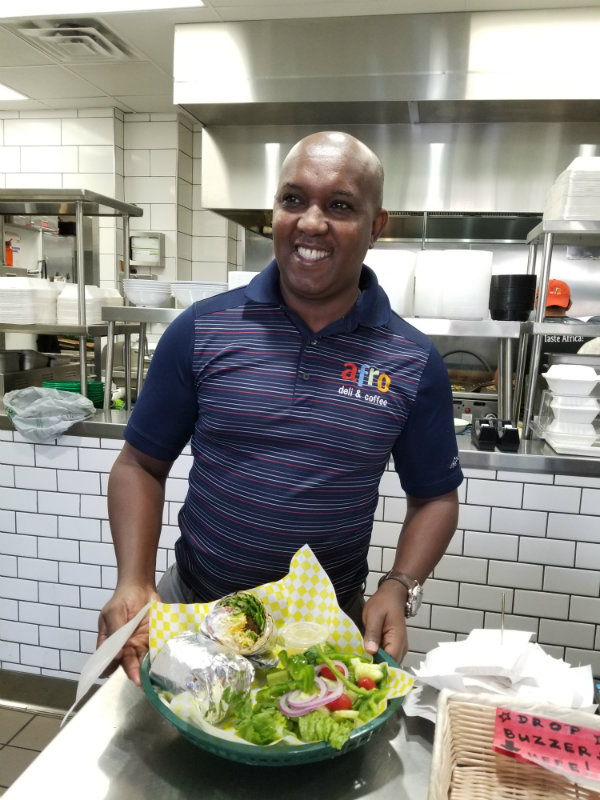
The place is meant to invite Minnesotans to try Somali food, Kahin says. He sees his restaurant as part of a growing trend of businesses trying to cross that cultural divide.
Kahin's success makes him an outlier compared with most of the Somali community in the Twin Cities. The unemployment rate in the Cedar-Riverside neighborhood is nearly 18 percent—four times higher than the unemployment rate across the state of Minnesota as a whole (3.3 percent in October 2017) and further still above as the unemployment rate in Minneapolis (3 percent in September 2017).
Still, the refugee community has a sizeable economic footprint. Statewide, African immigrants earned an estimated collective income of $1.6 billion in 2014 and paid more than $183 million in state taxes, according to a study by Bruce Corrie, an economist at Concordia University in St. Paul. There are more than 2,000 African-owned businesses in the state, Corrie found, and more than 200 of them are owned by Somalis, according to the Minnesota Somali Chamber of Commerce.
Immigrant entrepreneurs face all the same difficulties as anyone else who wants to start a business, but with added cultural barriers. For Somali businesses, one of the biggest problems can be access to credit. "Banks won't even listen to you, no matter how good your idea might be," says Kahin. He opened The Afro Grill with help from a nonprofit, the African Development Center, that uses a mix of public and private funding to help immigrants launch businesses.
Banks might be unwilling to lend to refugees-turned-entrepreneurs, but there's also a religious barrier for many Somalis. Islam forbids borrowing or lending with interest, so devout Muslims have to find alternative banking solutions that aren't always readily available, says Samir Saikali, a grants manager at the St. Paul–based Neighborhood Development Center (NDC), a nonprofit that, like the one that helped Kahin launch his business, helps get promising immigrant businesses off the ground with a mix of private investment and state funds.
In addition to providing direct aid to new business ventures, the NDC runs a special banking program that comports with rules of Islam. To avoid charging interest, these banks will purchase an expensive item—a new freezer for a restaurant, for example, Saikali says—then will turn around and sell it to the business, at a mark-up. The buyer will pay off the expense on an installment plan, called "murabaha" in Arabic. Late fees and other penalties are fixed, not based on a percentage of the purchase price.
The NDC trains roughly 200 aspiring immigrant entrepreneurs each year. About 20 percent of them will eventually start a business in one of the organization's four targeted low-income, high immigrant neighborhoods. "People within a certain neighborhood are those who are best suited to develop their own neighborhoods, economically and culturally," says Saikali. "The goal is to build neighborhoods from within."
"We don't trust the FBI, and we have good reason not to."
In November 2016, during the final days of last year's presidential campaign, Donald Trump made a campaign stop in Minnesota. He spoke on the tarmac at Minneapolis–St. Paul International Airport, where nearly 1,000 Somalis are employed. But he wasn't there to talk about the hard-working immigrants who have boosted the state's economy. He was there to warn about the threat of Somali terrorism.
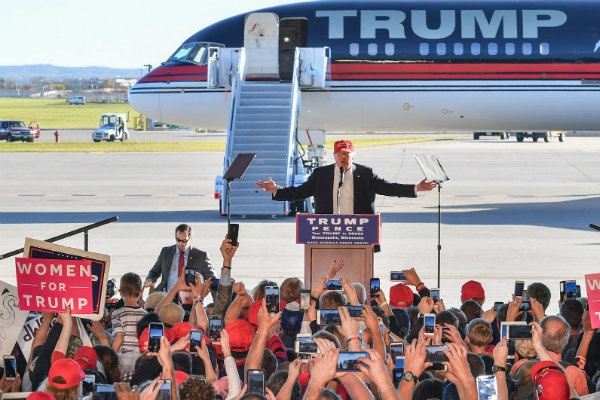
"Here in Minnesota, you've seen first-hand the problems caused with faulty refugee vetting, with very large numbers of Somali refugees coming into your state without your knowledge, without your support or approval," he said, calling the growing Somali community in the Twin Cities "a disaster." Trump argued that Somali immigrants intended to infiltrate American society as part of a terrorist campaign. "Some of them are joining ISIS," the soon-to-be-president said, "and spreading their extremist views all over our country and all over the world."
The U.S. Department of Justice says terrorist organizations in the Middle East have been actively trying to recruit Somalis living in Minnesota since at least 2007, when a group of about 20 Somali men and women left the Twin Cities to join the militant group al-Shabab. One of those men, Shirwa Ahmed, in 2008 drove a truck loaded with explosives into a government building in Puntland, Somalia. It was one of five simultaneous attacks carried out by al-Shabab that killed 28 people.
The Islamic State, a quasi-governmental terrorist group that rose to occupy significant portions of Iraq and Syria during 2014 –15, has similarly tried to recruit Minnesotan Somali-Americans to fight abroad or to conduct terror attacks on U.S. soil. An April 2015 video posted online by an ISIS-affiliated account specifically called for an attack on the Mall of America in suburban Minneapolis. In late 2014, the Minneapolis Star-Tribune cited "federal authorities" claiming that one Minnesota man had died in Syria while fighting for ISIS.
In response, the U.S. Department of Justice (DOJ), Department of Homeland Security (DHS), and FBI launched a joint program to work with local police departments in three American cities—Boston, Los Angeles, and Minneapolis—to develop "comprehensive prevention and intervention pilot programs to help counter violent extremism within local communities."
In February 2015, the Justice Department produced a report outlining the methods of a program for "countering violent extremism," or CVE. The goal was to recruit ", elders, community organizations and associations" in an effort to work against the perceived threat of terrorist recruitment in the Somali-American community.
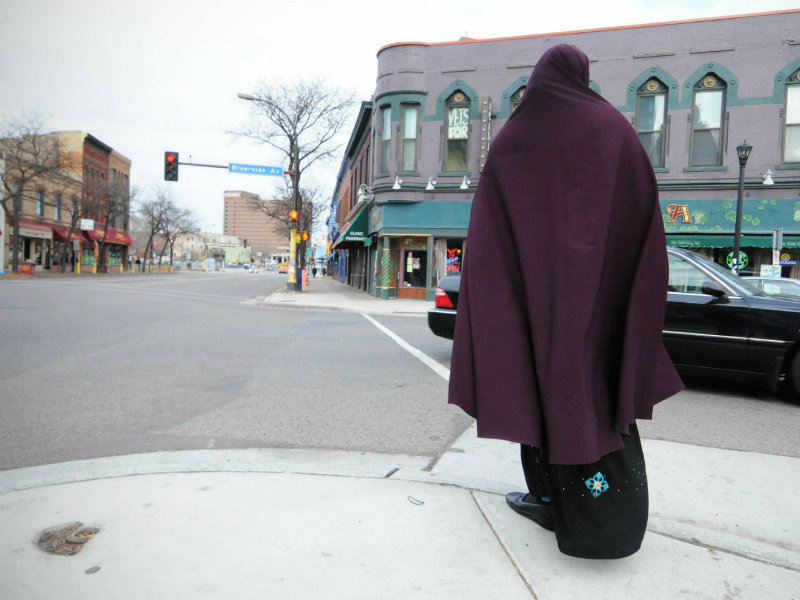
The chance of being killed in a terrorist attack in the United States is exceedingly low. Alex Nowrasteh, an immigration policy analyst for the Cato Institute, a free market think tank based in Washington, D.C., looked at the period from 1975 through 2015—a time frame that includes incoming waves not only of Somali refugees but also Vietnamese and Cuban refugees and, more recently, Iraqi and Syrian refugees. He found that 154 foreign-born terrorists carried out attacks on U.S. soil that killed 3,024 people. More than 98 percent of those deaths occurred on September 11, 2001.
Nowrasteh calculates that there were 3,252,493 refugees admitted in that 41-year period. Only 20 committed, or were convicted of attempting to commit, domestic acts of terrorism. That amounts to one terrorist entering the country as a refugee for every 162,625 non-terrorists. Put a different way, an American has a 1 in 3.6 million chance of being killed by a foreign-born terrorist per year, but just a 1 in 3.6 billion chance per year of being killed by a terrorist who entered the country as a refugee.
"Substantial administrative hurdles and barriers are in place to block foreign-born terrorist infiltration from abroad," he concludes. "A sensible terrorism screening policy must do more good than harm to justify its existence. That means the cost of the damage the policy prevents should at least equal the cost it imposes."
The FBI's CVE program has caused myriad problems for the Somali community, says Ayaan Dahir, executive director of the Minneapolis-based Young Muslim Collective, a left-leaning student organization launched specifically in response to the program and dedicated to building what the group calls "a cohesive coalition against an insidious surveillance ." Fears about surveillance and entrapment have put strain on people and businesses and decreased the level of trust: How many of those imams, elders, and community organizations are secretly informing? "We don't trust the FBI, and we have good reason not to," Dahir says. "And I think the average American shouldn't [trust the FBI] either."
To highlight the friction, she points to the fact that the bureau has a "community liaison" stationed at a community center in Minneapolis' Cedar-Riverside neighborhood, where Somali kids gather to play basketball and participate in other after-school activities. The FBI and local police see the deployment of officers into those environments as part of an overall strategy aimed at community engagement, intended to be a first line of defense against the potential radicalization of American Muslims.
Dahir says many members of the community see it differently. "Why do 8-year-olds need to have interaction with law enforcement apparatuses?" she asks. "What you are telling these children is that they are inherently violent and they have a future of being criminal and they need to be monitored at that young age."
"Misinformation is being presented as true, and it's being accepted because of who it is coming from."
As part of the joint DOJ/DHS/FBI pilot program, local officials and representatives of law enforcement hold regular roundtable discussions and community meetings, which are open to the public. These are supposed to assuage fears of surveillance and help build "community resilience" against radicalization, according to the Justice Department. But they can also be used to spread misinformation and increase paranoia, says Dahir. She relates the story of an FBI agent at one such meeting telling the Somalis in attendance that they should welcome FBI agents into their homes as long as they have nothing to hide.
"Somebody else had to go up there and immediately correct that," Dahir says. "Misinformation is being presented as true, and it's being accepted because of who it is coming from."
A 2016 report from the Government Accountability Office (GAO) found that the CVE program lacked a strategic plan and had no clearly established process by which to measure its effectiveness. "We could not determine the extent to which the United States is better off today as a result of its CVE effort than it was in 2011," the GAO concluded. "That is because no cohesive strategy with measurable outcomes has been established to guide the multi-agency CVE effort towards its goals." In other words, the program has increased tensions between law enforcement and the Somali community, but there's little evidence that it has done much to make Americans safer.
The CVE program launched under President Obama. But Trump has seized anti-terrorism programs created by his White House predecessors, and his administration could weild those tools in ways that create more barrier for innocent immigrants from Muslim nations, and for those who have lived here for decades.
In September 2016, five years after the program launched, a Somali who came to America on a refugee visa stabbed 10 shoppers and employees at a St. Cloud mall. He was likely motivated "by some sort of inspiration from radical Islamic groups," according to then-FBI Director James Comey. Earlier in the year, three were convicted in federal court last year; the other six pleaded guilty.
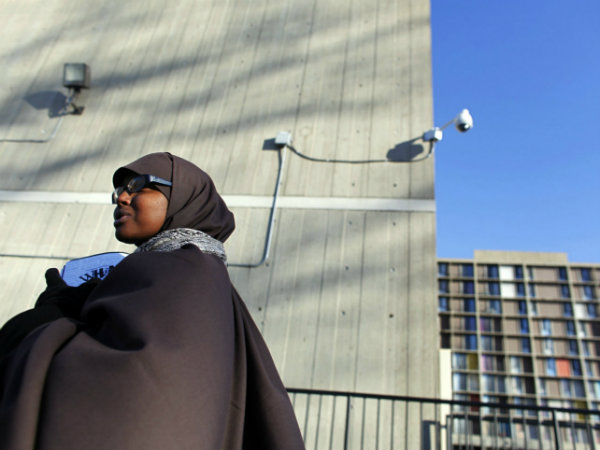
Beyond the FBI, the Trump administration has taken steps to restrict the flow of refugees into the United States in the name of keeping Americans safe. Under the guise of stopping terrorists from entering the country, the administration has written—and repeatedly rewritten—its so-called "travel ban," which blocks immigrants and visitors from a number of Muslim-majority countries. The list of nations included in the travel ban has changed, but Somalia has been included in each one.
Somali immigrants already face tightened allowances, some of which target them directly. In the fiscal year that ended in September 2017, the United States accepted 53,716 refugees from all countries down from 84,994 the previous year. The total for 2017 was the eighth-lowest since the 1975, when the U.S. started tracking refugee immigration. The Trump administration plans to reduce the number admitted again next year, with a ceiling of only 45,000.
In October, Sayfullo Habibullaevich Saipov, a Uzbek immigrant who came to the United States in 2015, drove a rented truck into a crowd of people in lower Manhattan. Saipov's rampage killed eight people, six of whom were foreigners visiting from Argentina and Belgium, and injured 11 others. After being shot by police and arrested, Saipov claimed allegiance to ISIS. Following the attack, the Trump administration moved to further increase scrutiny for immigrants and asylum-seekers from Muslim-majority countres
"I have just ordered Homeland Security to step up our already Extreme Vetting Program [sic]," Trump tweeted hours after the attack. "Being politically correct is fine, but not for this!"
"It's not about us versus them."
The Somali Museum of Minnesota can be found in the basement of a nondescript, partially vacant retail building along Lake Street in Minneapolis. Its three rooms are filled with carvings, flags, utensils, cookware, and traditional clothing salvaged from Somalia by the curator, Osman Ali, or donated by other refugees. In one corner, there's a replica of a traditional Somali dwelling, a single-room hut with a thatched roof where Ali says an entire family would sleep together.
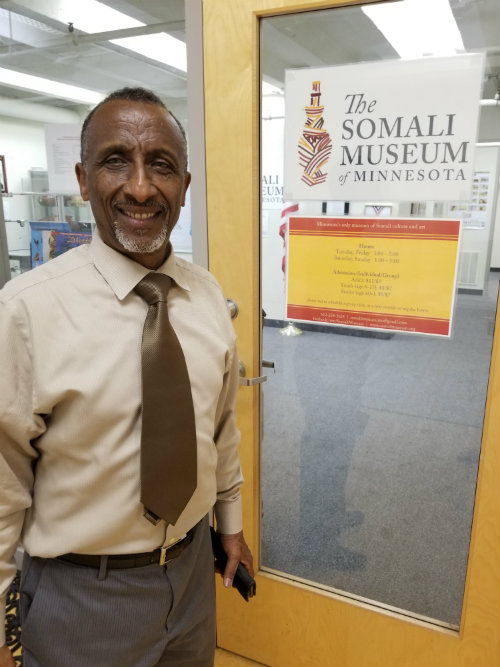
Museums in Mogadishu were looted and destroyed during the civil war in the 1990s. Ali claims this is now the largest collection of Somali historical artifacts anywhere in the world.
Born in Somalia, Ali has lived in Minnesota since 1997 but makes frequent trips back to his homeland to scrounge for new pieces. The main purpose, he says, is to retain Somali culture for immigrants and their children. But the museum also serves as a platform for Ali's efforts at outreach to the local government.
Housing department officials, police, and other public agents come to the museum for classes that attempt to address cultural differences between Americans and Somalis. For example, gesturing for someone's attention or asking him to come closer by wiggling a single, upturned finger—a common, inoffensive move in America—can be read as an insult by Somalis. "They call their dogs like this," Ali explains, wiggling a single finger. Using a cupped hand is a more friendly form of the same gesture, he says.
Despite the troubles facing his countrymen at home and abroad, he is optimistic about the Minnesota Somali community's overall trajectory. He knows about Kahin's new restaurant. "He's doing such great things," says Ali.
Equally important to Somali identity in the Twin Cities, he says, was the election of state Rep. Ilhan Omar (D–Minneapolis) in 2016. Omar, who declined to be interviewed for this piece, fled the civil war in Somalia as a child, then lived for four years in a refugee camp in Kenya before eventually making her way to the United States. "The Somali community is becoming voters," Ali says. "Before that, they didn't see that they could make a difference with their vote."
Omar, an activist in the Somali community before her election, defeated state Rep. Phyllis Kahn, who had served in the state House since 1973, in a hotly contested Democratic primary last year.
Kahn initially dismissed the younger woman's campaign as "attractive to the kind of, what we call the young, liberal, white guilt-trip people." Omar's victory, though, seems to reflect both the leftward trend of Democratic politics nationally and the growing political clout of the Minnesota Somali community.
Omar made police reform a centerpiece of her campaign—a policy position that gained special salience in the Twin Cities after an officer shot and killed Philando Castile, a black man, in the nearby suburb of Falcon Heights last year just weeks before the primary election. Castile had been pulled over for a busted tail light; he was shot and killed while reaching for his identification.
Afterward, Omar proposed a statewide ban on traffic stops for vehicle violations like expired registrations and broken taillights, which she says give police too much discretion and can be abused to target certain communities and individuals. She also called for more accountability from police departments investigating lethal incidents, which she says would increase trust within Minnesota's minority communities.
Omar's general election victory, which happened the same day Trump won the presidency, was all but guaranteed. Her district is one of the bluest in the whole state legislature. But it still had significance for Ali. Omar's Republican opponent, Abdimalik Askar, was also a Somali-American. "It is not about 'us versus them,'" Ali says, beaming with pride. "It is Somalis running on both sides."
"People don't discriminate…as long as it tastes good"
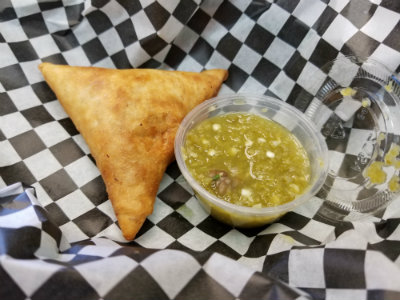
At the end of our conversation at The Afro Deli, Kahin brings me a cardboard shell containing a pair of fried pockets of dough, roughly triangular in shape. These are sambusas, a sort of Somali pierogi, deep-fried and filled with a mixture of beef, lamb, and spinach, along with lentils and cilantro. They are one of the most popular items on the menu, Kahin says.
From the open kitchen comes the sweet sound of sizzling meat as a line cook grills up some Somali steak sandwiches—think cheesesteaks without the Cheez Whiz, topped with diced tomatoes and fried onions, and served on focaccia bread instead of a hard roll. Focaccia is common in Somali dishes, Kahin tells me, appropriated from the Italians who colonized the region in the mid-1800s. The idea, he says, is to "invite Minnesotans to see what Somali cuisine tastes like."
Kahin recognizes that outsiders often arouse suspicion, and that integration can be a slow and cyclical process. Irish immigrants were once told that they "need not apply" to many jobs in America. Italians coming to America in the early 20th Century were portrayed as rats in anti-immigrant publications of the time. Chinese immigrants in California were denied the right to vote or work in the public sector in the initial version of the state's constitution.
While every ethnic group still faces some discrimination even today, the passage of time is likely to see Somalis, too, accepted into the interwoven fabric of America. "The Somali immigrant of today, after 100 years, is going to say, 'We don't like the immigrants in this country,'" says Ali, only half-joking.
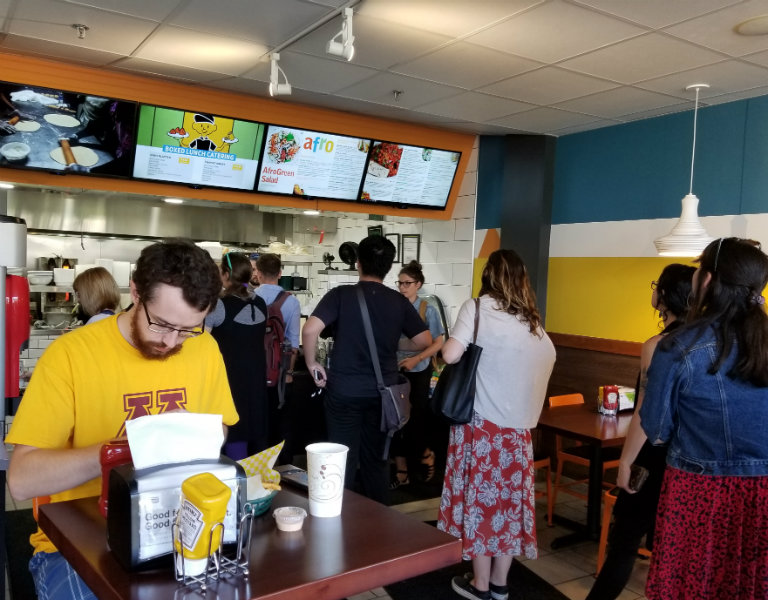
Kahin says he's witnessed the FBI's increased involvement in the Somali community during the past few years. But he disagrees with the notion that the bureau is making things worse by being present. Terrorism "is a big deal," he says, "but I think it's about lack of information. Lack of trust. Lack of understanding." Most Muslim terrorist attacks kill Muslims in other countries, not non-Muslim Americans, he says, pointing to the recent truck bombing in Mogadishu that killed more than 50 people, including a Minnesota man who was visiting relatives.
He blames the media and politicians for perpetuating the image of Somalis as terror threats. The president is making it more difficult for others who might one day follow in Kahin's path, he says—a path that millions of other immigrants have walked throughout American history.
Would it be harder for someone coming from Somalia today to do the things he's done—settle in the United States, start one business, watch it fail, then start another and see it grow into something successful? "Of course," he says. "We live in a different age now."
But Kahin would prefer not to talk about politics, or the president. Trump is divisive, and Kahin believes he is deliberately attacking refugees to score political points.
Instead, Kahin wants to talk about his restaurant—about his efforts at bringing cultures together over food. To him, everyone's a potential customer. "Trump people eat my food too," he says. "People don't discriminate…as long as it tastes good."


Show Comments (28)